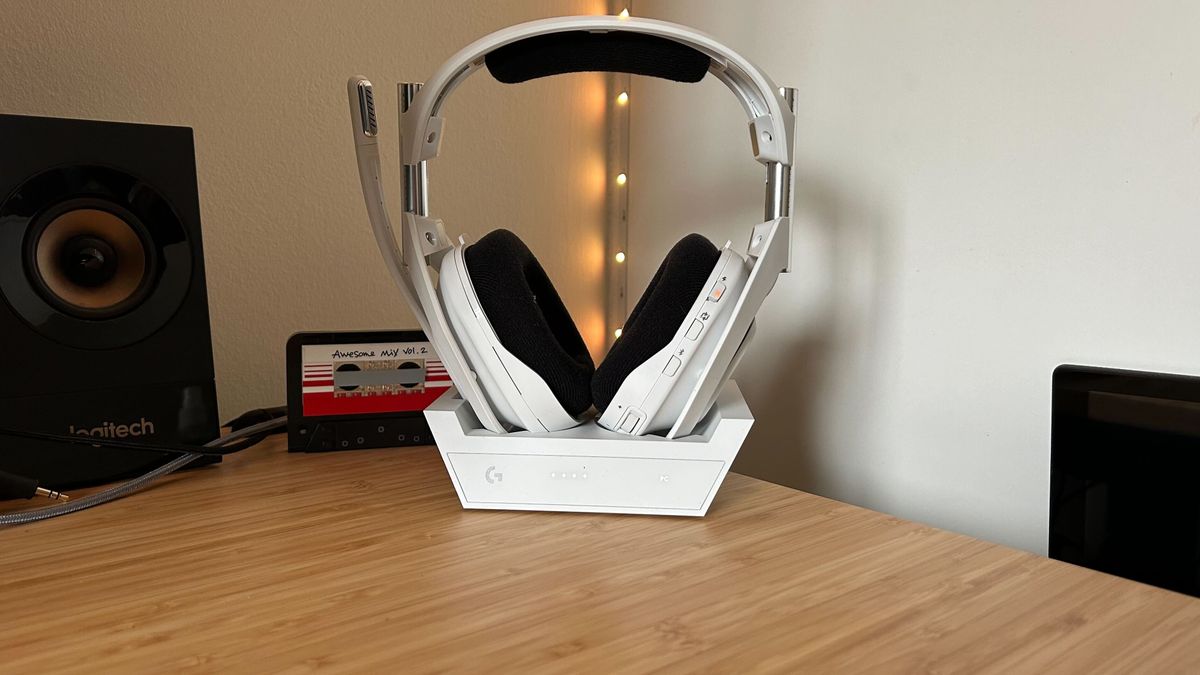12DOVE Verdict
The Astro A50 X so nearly got a perfect score, but some sacrifices in practicality have shaved half a star from its glowing report. In the right setup, though, this is all you need for high-end audio with unique first of its kind features.
Pros
- +
Fantastic compatibility
- +
HDMI switcher features
- +
Robust, detailed sound quality
- +
Powerful microphone
- +
Super comfortable design
Cons
- -
Bluetooth limited to base station
- -
Requires an all-in-one setup
Why you can trust 12DOVE
It's now been nearly four years since the last Astro gaming headset hit the shelves, and with the line's dominance in the world of high end cups this next generation needed to make a splash. It's made waves.
The Astro A50 X maintains the range's classic form factor and iconic docking base, but it's also the first gaming headset to offer HDMI switching between PS5 and Xbox Series X. As long as both consoles are in rest mode you'll be hopping between the two without even leaving the couch - it's basically the dream.
That excellent functionality is backed up by super impressive audio and a comfortable design but the Astro A50 X isn't without its hiccups. There are some Bluetooth and design drawbacks here, but they're certainly not enough to keep this powerhouse away from being one of the best gaming headsets on the market right now.
| Price | $379.99 / £359.99 |
| Connection | 2.4Ghz / Bluetooth |
| Drivers | Graphene 40mm |
| Frequency response | 20Hz - 20kHz |
| Microphone | Omnidirectional flip |
| ANC | None |
| Controls | Power, HDMI switch, Bluetooth, volume, chat mix |
| Battery | 24 hours |
| Weight | 363g |
| Compatibility | PC, PS5, Xbox, Nintendo Switch (limited), mobile (limited) |
Design
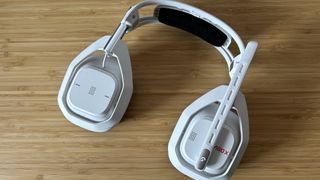
This is unmistakably an Astro headset, with crisp angular lines and a smoother curve to the cups themselves. It's certainly a distinctive look, but one I got used to pretty quickly - even if the metallic adjustment poles jutting out from the top made me feel like a Cyberman even after weeks of use. This isn't anything we've not seen before, both the headset and its geometric base station look pretty much identical to previous iterations.
This is a plastic construction, apart from the adjustment sliders, but everything still feels solid in the hand. Each side rotates a full 90 degrees to allow them to be set fully flat against a surface. Usually I would say that's a great benefit for travel, but we'll see later why this is a little redundant. Still, for everyday wear these are particularly malleable struts with that customization allowing for a flush position against the side of the head - at whatever angle that means for you.
Combined with the soft foam earpads and block of padding running under the top of the headband, the Astro A50 X is among the more comfortable gaming headsets on the market right now - even if it sits in the middle of the pack in terms of weight. The dense foam used in these cushions does mean things can get a little toasty - far quicker than I've noticed with other headset. However, these are magnetically detachable and can be swapped with cooler leatherette pads should you wish.
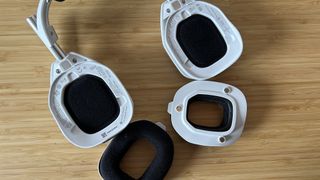
That extra swing does mean dropping the headset onto the base station can get a little finicky though. The contacts at the bottom of each cup never seemed to connect straight away during my testing, usually requiring some wiggling around of each cup to get it seated within the outline of the base itself.

The base is as you would expect from an Astro headset, matching the headset's black or white colorway and constructed from a sturdy, ever so slightly gritted plastic. Four LEDs show battery level along the front, and the currently connected platform is also displayed to the right. All the ports (and there are many) are hidden away to the rear and do a good job of keeping trailing wires out of sight.
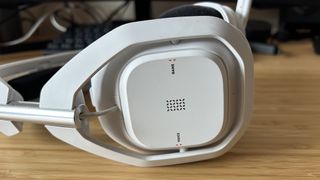
Controls are all housed on the right cup, which also features a large chat mix rocker across the entire panel. That's incredibly handy, allowing for quick adjustments without having to feel around for an extra dial that's not the main volume control. I did notice, however, that this was particularly easy to knock when adjusting the headset in everyday use, often putting balances out of whack every now and then.
Features
This is the big one. The Astro A50 X has a feature list that no other gaming headset can boast. The back of the base station houses three HDMI ports and three USB-C ports. These are used to connect your headset to a PS5, Xbox Series X, and PC all at the same time, and the switch button on the cups themselves allow you to quickly and seamlessly swap between these inputs with just one tap.
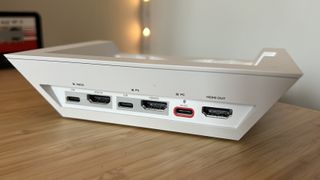
Even the best wireless gaming headsets can't crack the Xbox / PlayStation compatibility code, but this is certainly one solution that comes with plenty of additional benefits. These consoles both use completely different wireless connections, which is why you'll so often see the same headset branded for either Sony or Microsoft's devices. By using the HDMI signal, the Astro A50 X can take the audio straight out of the video output and send it back through to the TV with full HDMI 2.1 4K 120Hz goodness - problem solved. The USB-C ports next to each HDMI handle all your microphone audio. PC users are a little left out of this party, though, when connected to my computer upstairs I was limited to either a DisplayPort or USB-A connection.
That brings us to a quick reality check. The Astro A50 X essentially acts as an HDMI switcher box while also benefitting from additional audio information being shared through that cable. However, it's incredibly difficult to actually get the most value you possibly can out of this device. DisplayPort means your PC gameplay is - generally speaking - going to be limited to your desk. I (as well as countless others) keep my consoles in the living room next to the TV. That means every time I wanted to go downstairs and kick back with some Evil West on PS5 I had to fully unplug the base station, take it with me, and then root around for the right cables to connect everything.
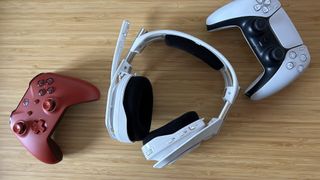
There's a similar story when it comes to travel. Yes, the Astro A50 X has Bluetooth functionality but it's limited to the base station itself. That means you can't connect the headset directly to a system like Nintendo Switch, handheld PC, or gaming phone. I regularly journey back and forth between counties on the weekends, often bringing my Asus ROG Ally, Switch, and gaming laptop with me. The idea of having to include the full base station, and associated cables, in that already stacked backpack was enough to have me running for a different device in this instance.
These are noteworthy sacrifices (especially at nearly $400), but they do sit on the fringes of the Astro A50 X's experience. This is a gaming headset primarily designed for multiplatform console users, after all - so they're always going to be the ones who benefit most from its feature set. When placed in between a PS5 and an Xbox, the A50 X is faultless.
Logitech's Lightspeed wireless connection means top end speeds and reliability, with a range that I never managed to step out of when listening to music around the house. Logitech G Hub is there for all your EQ tweaks and microphone settings - this is a barebones program but it gets the job done nice and easily and with a particularly navigable interface. Plus, you've also got PC and Xbox spatial audio and Dolby Atmos support here, and full compatibility with PS5's Tempest 3D. On top of all that, the Astro A50 X is also privy to the same graphene driver tech running inside the Logitech G Pro X2.
Performance
Those 40mm graphene drivers bring us to performance discussion, which I'll kick off by saying this is the best audio I've personally heard through a gaming headset yet. If it weren't for some aforementioned practicality hiccups, the sound quality would be enough to have the A50 X knocking on the SteelSeries Arctis Nova Pro Wireless's top spot.
Everything is incredibly well spaced, from music to movies and games, with a balancing between ranges that forms particularly well detailed soundscapes no matter which device I was running. Even the starting lineup of Mario Kart 8 Deluxe on a lowly Nintendo Switch was improved, with the rumblings of engines highlighted far more than I've ever experienced before.
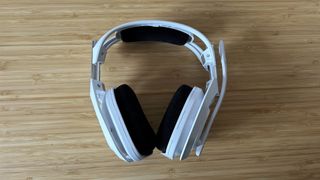
The low end is powerful but still clean, with a thumping bass that never distorted itself or dominated where it wasn't supposed to. Meanwhile, higher ranges were wide open with super precise detailing and a warm tone rarely found in gaming headsets. All of that culminated in the middle, which manages to remain nimble enough to handle competing sound effects while still providing a crystal clear sound and spacious staging across both music and games. The directional audio in here feels tailor made for more competitive pursuits, with particularly accurate positioning.
Doom Eternal had never sounded as delicately balanced as it did with the Asto A50 Xs on my noggin, and even the patter of rain in We Happy Few felt more rounded and immersive. Over on console, the growls of monsters and subsequent thwack of Jesse Rentier's fists were bold and impactful, cutting through the cacophony of other sound effects to hold their own both on the battlefield and in more atmospheric areas.
All that and Logitech certainly hasn't skimped on the mic. Crisp, clear, and loud, I was incredibly impressed with the results of my voice tests, with colleagues noting its quality from simple everyday work calls as well.
Should you buy the Astro A50 X
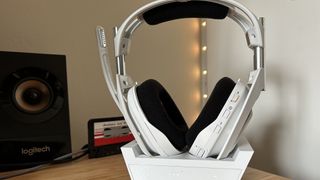
The Astro A50 X sits among the best audio experiences I've ever had from video games, but it's not going to be the best option for all. For one, that $379.99 / £359.99 MSRP puts it right at the top of the market right now, coming in more expensive than even the SteelSeries Arctis Nova Pro Wireless. While its audio is better overall, with more detailing in its still plenty powerful lower ranges and less distortion at higher volumes, the lack of Bluetooth on the headset itself means it's not quite as versatile as SteelSeries' all-in-one option. That matters when you're spending upwards of $300, but if you don't tend to play while travelling it's an easier pill to swallow. SteelSeries does, however, pack its extensive EQ settings onto its transmitter hub for a far easier tweaking process and features active noise cancellation and hot-swappable batteries. Overall, SteelSeries still has the top spot here in general - but if you play across both PS5 and Xbox Series X pretty much exclusively at home then Astro gains a significant edge.
The Turtle Beach Stealth Pro is another headset looking to do a similar job. Its own wireless transmitter can also connect to multiple devices (though obviously without that HDMI switching functionality), and it's cheaper than both Astro and SteelSeries. You're still paying big bucks here, though, and the audio quality isn't as strong as either.
All in all, this is a must-see for anyone who splits their time between PS5 and Xbox Series X. That price is a little much for those after a PC headset by itself, and those who need a Nintendo Switch headset or Steam Deck headset for the on the go play need not apply. However, if you've got the setup for it - and you can swing the price tag - this is a massive upgrade in sound quality and functionality.
| Specs | Astro A50 X | SteelSeries Arctis Nova Pro Wireless | Turtle Beach Stealth Pro |
|---|---|---|---|
| Price | $379.99 / £359.99 | $349.99 / £329 | $329.99 / £279.99 |
| Connection | 2.4Ghz / Bluetooth | 2.4GHz / Bluetooth / wired | 2.4GHz, Bluetooth 5.1 |
| Drivers | Graphene 40mm | SteelSeries Premium High Fidelity Drivers | 50mm Nanoclear neodymium |
| Frequency response | 20Hz - 20kHz | 10Hz - 22kHz | 10Hz - 22kHz |
| Microphone | Omnidirectional noise canceling | Bidirectional Noise-Canceling | Unidirectional noise cancelling |
| ANC | No | Yes | Yes |
| Controls | Power, HDMI switch, Bluetooth, volume, chat mix | Power, mic mute, Bluetooth | Volume, power, multi-function button, Bluetooth, Superhuman Hearing |
| Battery | 24 hours | 22 hours per battery | 12 hours per battery |
| Weight | 363g | 337g | 400g |
| Compatibility | PC, PS5, Xbox, Nintendo Switch (limited), mobile (limited) | PC, PS5, Xbox (alternate version), Nintendo Switch, mobile | PC, PS5, Xbox (alternate version), Nintendo Switch, mobile |
How we tested the Astro A50 X
I used the Astro A50 X as my sole gaming headset for three weeks, using the device for the majority of my work calls but all video games. In that time I tested across Doom Eternal, CS:GO, and Horizon Forbidden West while also playing We Happy Few, Evil West, and Mario Kart 8 Deluxe. For more information on how we test gaming headsets, check out the full 12DOVE Hardware Policy.
We're also rounding up all the best PS5 headsets and the best Xbox Series X headsets as well - or check out the best Razer headsets for something a little different.

Managing Editor of Hardware at 12DOVE, I originally landed in hardware at our sister site TechRadar before moving over to GamesRadar. In between, I've written for Tom’s Guide, Wireframe, The Indie Game Website and That Video Game Blog, covering everything from the PS5 launch to the Apple Pencil. Now, i'm focused on Nintendo Switch, gaming laptops (and the keyboards, headsets and mice that come with them), PS5, and trying to find the perfect projector.
